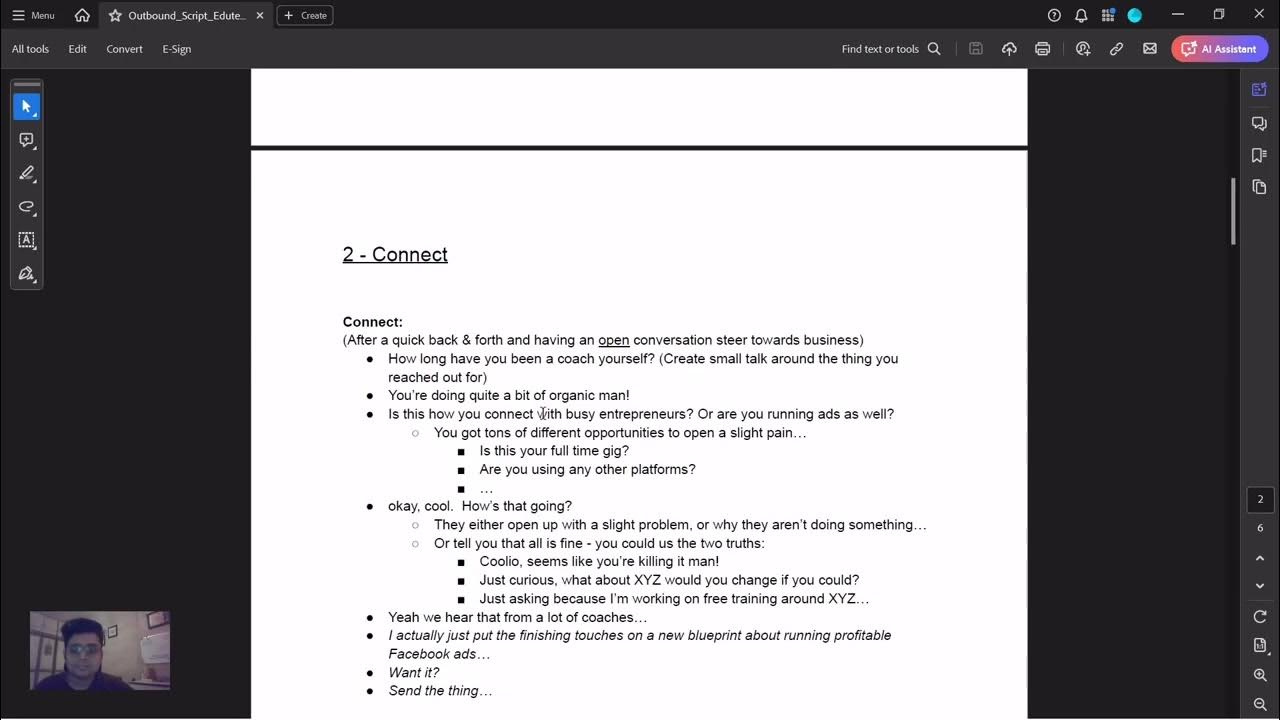Como acertar nos 30 primeiros segundos de uma chamada fria
Summary
TLDRThis video provides a practical guide to successful cold calling, focusing on the process of identifying, qualifying, and engaging potential clients. The speaker shares proven strategies for personalizing calls, establishing rapport, and addressing client pain points. By asking insightful questions and offering tailored solutions, the goal is to schedule a follow-up meeting and move the conversation forward. Emphasizing the importance of preparation, creating value, and building urgency, the video also showcases a real-life cold call example that demonstrates how to effectively secure a meeting with a potential client. This method can help boost sales with minimal effort.
Takeaways
- 😀 Research your prospect thoroughly before making a cold call to understand their problems and tailor your pitch to their needs.
- 😀 Avoid generic approaches like telemarketing. Focus on delivering a solution that speaks directly to the prospect's challenges.
- 😀 Use previous interactions (e.g., emails or messages) to create a natural opening for your cold call.
- 😀 Build rapport by finding common ground, such as discussing current events or mirroring the prospect’s communication style.
- 😀 Ask qualifying questions to understand the prospect’s pain points and whether they are the decision-maker.
- 😀 Use authority-building statistics or industry insights to position yourself as a credible expert.
- 😀 Focus on generating awareness of the problem and offering a potential solution, not trying to sell your product immediately.
- 😀 Present your product as a strategic opportunity, helping the prospect visualize a solution to their challenges.
- 😀 Create urgency by offering only a couple of available time slots for a follow-up meeting, ensuring they commit to one.
- 😀 Always have a clear and easy next step—schedule the meeting and send an invite immediately after agreeing on a time.
- 😀 The cold call's main goal is to book a meeting for a more detailed conversation, not to close the deal on the first call.
Q & A
What is the primary goal of cold calling according to the script?
-The primary goal of cold calling is to generate awareness in the prospect that they have a problem, show that there is an opportunity for improvement, and ultimately secure a time to schedule a more detailed meeting to diagnose and present a solution.
Why is it important to research your prospect before making a cold call?
-Researching your prospect is crucial because it allows you to understand who they are, their business needs, and challenges. This preparation helps you tailor your approach, making the conversation more relevant and effective.
What is a common mistake people make when making a cold call?
-A common mistake is treating a cold call like a generic sales pitch. Instead of simply trying to sell a product, you should focus on asking questions and offering value that addresses the prospect's specific needs.
How does referencing a previous email or message improve the cold call?
-Referencing a previous email or message helps establish context and makes the call feel less intrusive. It gives the prospect a reason to engage, even if they haven’t read or responded to the initial communication.
What role does finding common ground play in a cold call?
-Finding common ground helps build rapport and trust with the prospect. It could be related to industry events, shared knowledge, or even personal interests, making the conversation feel more human and less transactional.
Why is it important to match the speed of communication with the prospect?
-Matching the speed of communication with the prospect creates a sense of connection and makes the conversation smoother. If the prospect speaks slowly, speaking at the same pace shows that you're attentive and adaptable.
How do you qualify a lead during a cold call?
-Lead qualification during a cold call involves asking questions to determine if the person is the decision-maker, whether they have the budget to resolve their problem, and if they consider solving the issue a priority.
What is the purpose of asking about a prospect's sales team performance?
-Asking about a prospect's sales team performance helps uncover potential challenges they are facing. It provides insights into whether they might need a solution to improve their sales process, which can be directly addressed by your product or service.
Why is it important to offer limited time slots for meetings?
-Offering limited time slots for meetings creates a sense of urgency, encouraging the prospect to take action quickly. This helps secure a meeting rather than leaving it to chance or prolonging the decision-making process.
What steps should be taken after scheduling a meeting with a prospect?
-After scheduling a meeting, you should send a calendar invite to confirm the time, reiterate the value of the meeting, and ensure that the prospect understands the next steps. This helps reduce no-shows and ensures that the prospect is fully prepared for the meeting.
Outlines

This section is available to paid users only. Please upgrade to access this part.
Upgrade NowMindmap

This section is available to paid users only. Please upgrade to access this part.
Upgrade NowKeywords

This section is available to paid users only. Please upgrade to access this part.
Upgrade NowHighlights

This section is available to paid users only. Please upgrade to access this part.
Upgrade NowTranscripts

This section is available to paid users only. Please upgrade to access this part.
Upgrade NowBrowse More Related Video

outbound appointment setting script

Cold Calling 101: 13 Steps to Cold Calls That Work!

Interview with Charlotte Lloyd, Founder & B2B Sales Trainer

How to Cold Pitch Freelance Copywriting Clients (⚠️Avoid these mistakes to get responses)

Step by step how I'd make $10k per month ASAP if starting again

Let's talk about cold calling drivers
5.0 / 5 (0 votes)